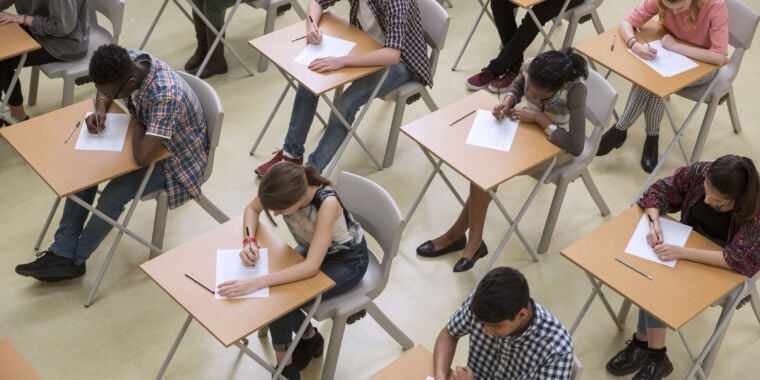Researchers create 30 fake student accounts to submit model-generated responses to real exams. Professors grade the 200 or 1500 word responses from the AI undergrads and gave them better grades than real students 84% of the time. 6% of the bot respondents did get caught, though… for being too good. Meanwhile, AI detection tools? Total bunk.
Will AI be the new calculator… or the death of us all (obviously the only alternative).
Note: the software was NOT as good on the advanced exams, even though it handled the easier stuff.
Not at all surprising. ChatGPT ‘knows’ a course’s content insofar as it’s memorized the textbook and all the exam questions. Once you start asking it questions it’s never seen before (more likely for advanced topics that don’t have a billion study guides and tutorials for) it falls short, even for basic questions that’d just require a bit of additional logic.
Mind you, memorizing everything is impressive and can get you a degree, but when tasked with a new problem never seen before ChatGPT is completely inadequate.
Right? Can students use the internet on this test? Because the LLMs have the entire internet to search for the answers, and I guarantee you those textbooks and exam questions are online and searchable.
I wonder how undergrads would do on the same exams given unlimited time and internet access but with LLMs blocked. That’s essentially what the LLMs have.
The LLMs blocked themselves?
I don’t think they really query one another. Maybe they do though?
Memorizing everything is impressive for a human.
It’s less impressive for a computer.
This is incorrect as was shown last year with the Skill-Mix research:
Furthermore, simple probability calculations indicate that GPT-4’s reasonable performance on k=5 is suggestive of going beyond “stochastic parrot” behavior (Bender et al., 2021), i.e., it combines skills in ways that it had not seen during training.
I don’t care. Maid robot when
Like a Roomba?
I want mine with cat ears.
Now we know how to beat AI. We just have to pass the No LLM Left Behind act.
I take it that this was social sciences because based on what I have seen so far I don’t think it can even outperform a college kid in maths
All this moral panic is garbage.
Easily solved by using essays with an unseen question written in exam conditions as assessment instruments.
Literally a pencil and paper solves this problem.
A lot of students do not perform well under exam conditions due to stress and pressure. Also, unless you’re entirely eliminating coursework, it doesn’t remove the issue.
No assessment method is perfectly suited to every student.
Coursework can be similarly adapted.
Coursework can be similarly adapted.
How?
It’s not my job to educate you on how the education industry works. Go and read what qualified people have already written about it in academic journals.
This is the best summary I could come up with:
“Since the rise of large language models like ChatGPT there have been lots of anecdotal reports about students submitting AI-generated work as their exam assignments and getting good grades.
His team created over 30 fake psychology student accounts and used them to submit ChatGPT-4-produced answers to examination questions.
The anecdotal reports were true—the AI use went largely undetected, and, on average, ChatGPT scored better than human students.
Scarfe’s team submitted AI-generated work in five undergraduate modules, covering classes needed during all three years of study for a bachelor’s degree in psychology.
Shorter submissions were prepared simply by copy-pasting the examination questions into ChatGPT-4 along with a prompt to keep the answer under 160 words.
Turnitin’s system, on the other hand, was advertised as detecting 97 percent of ChatGPT and GPT-3 authored writing in a lab with only one false positive in a hundred attempts.
The original article contains 519 words, the summary contains 144 words. Saved 72%. I’m a bot and I’m open source!
84% of this summary was better than mine
Good bot
falls short later
So far… Next model will be even better, and it won’t stop getting better.





